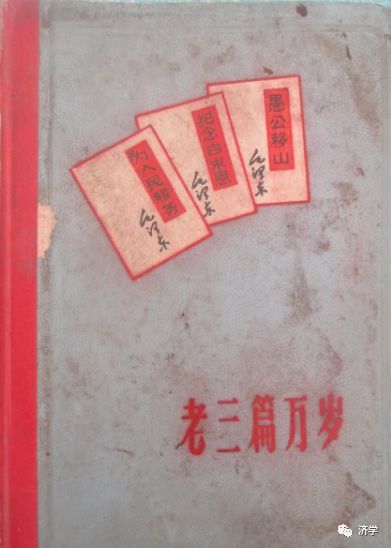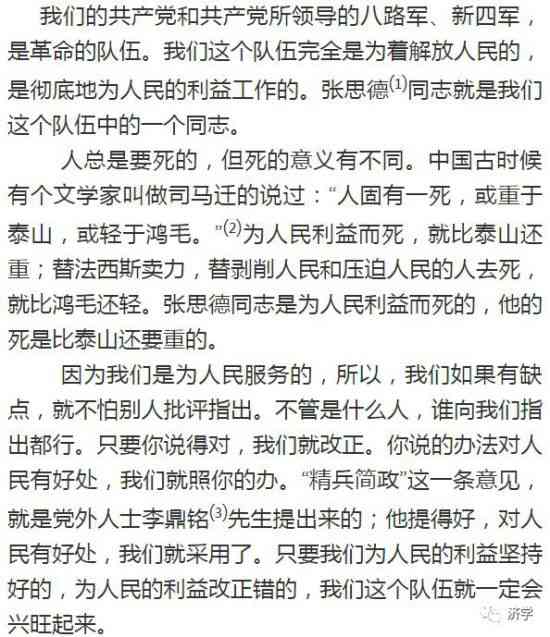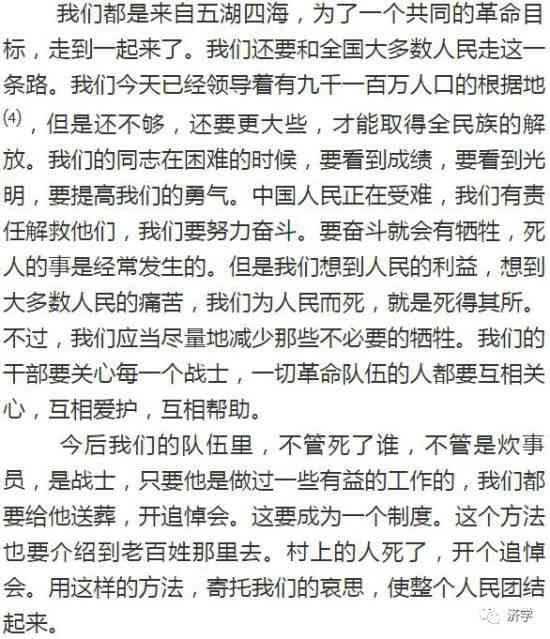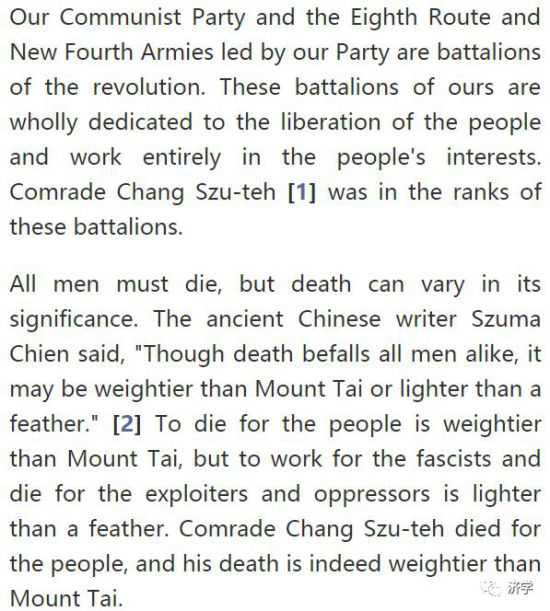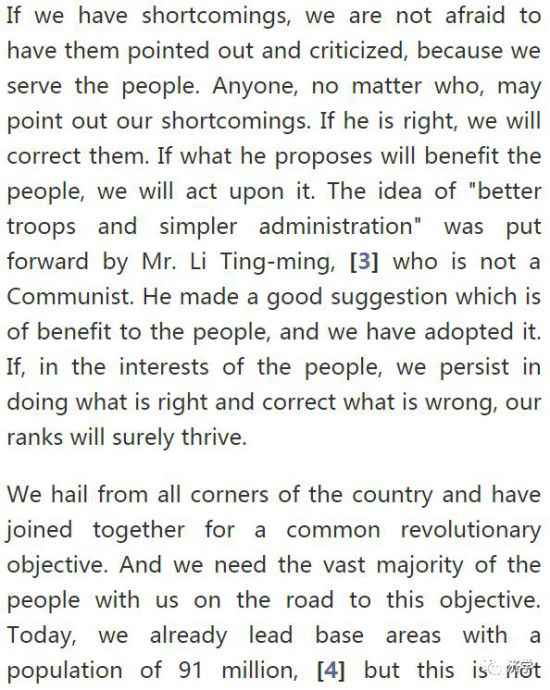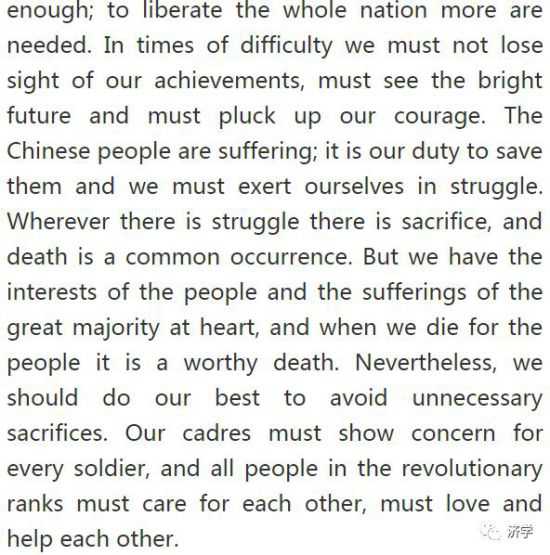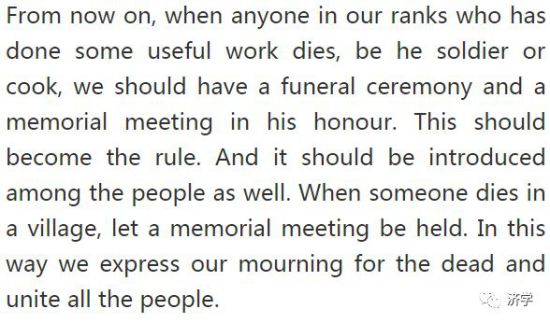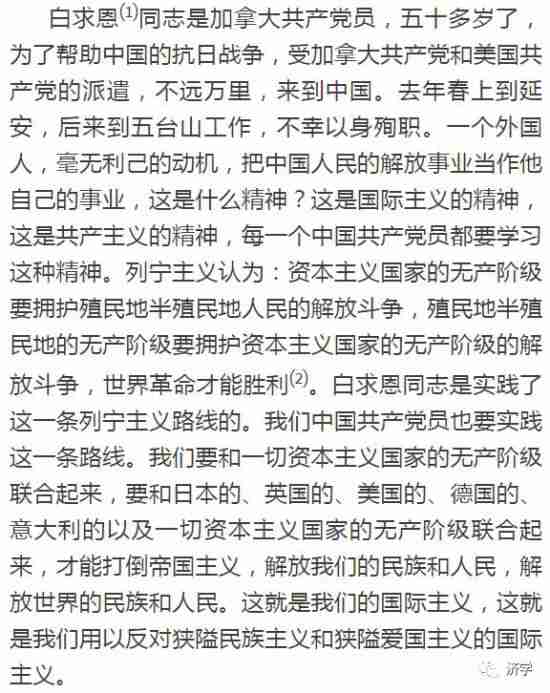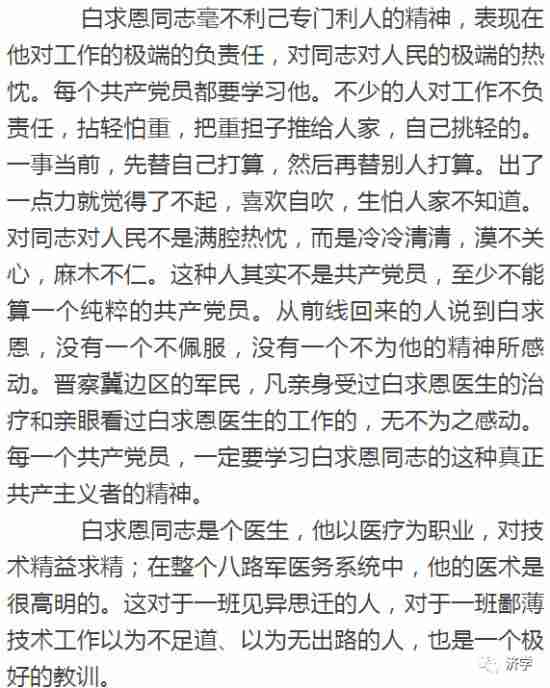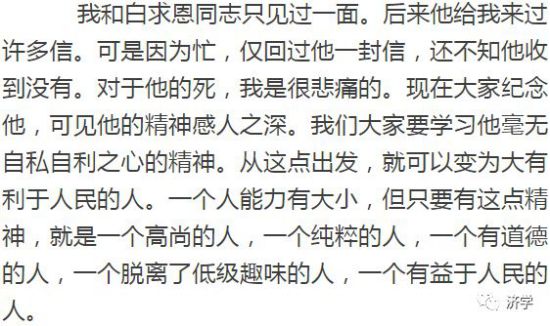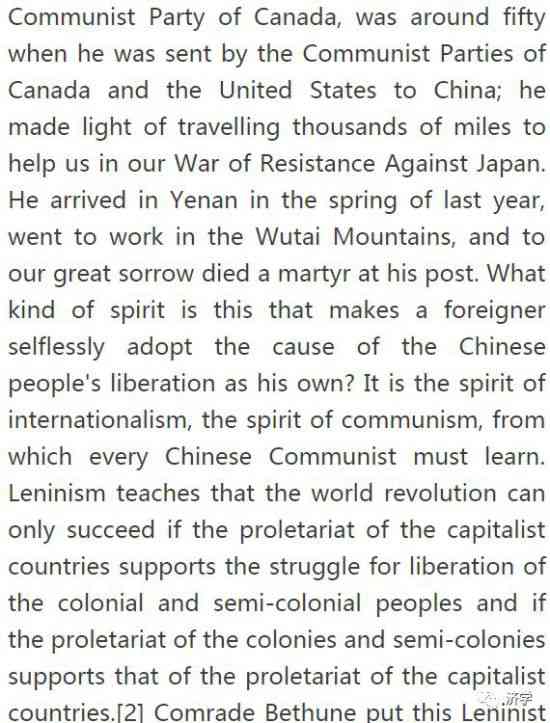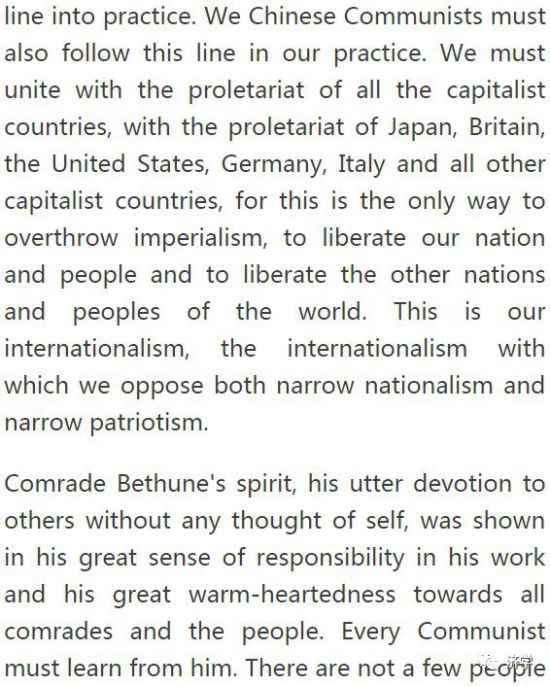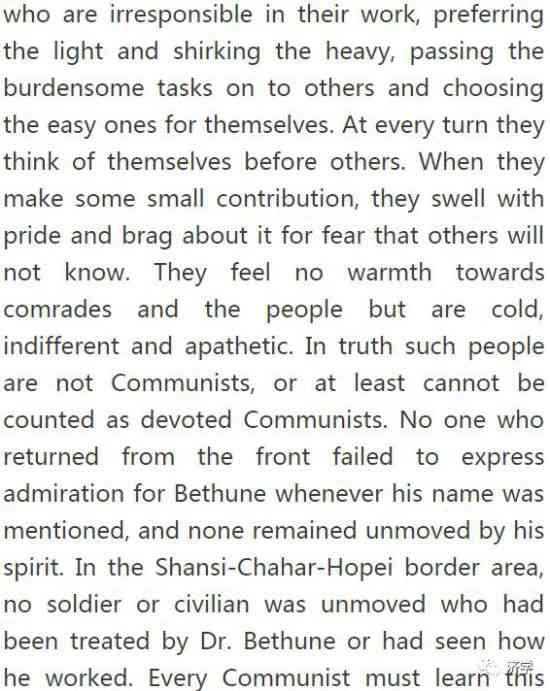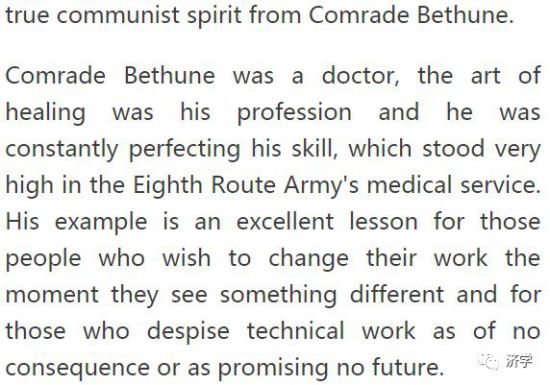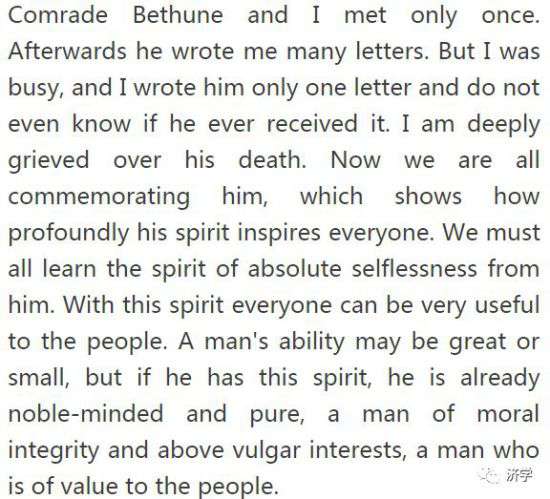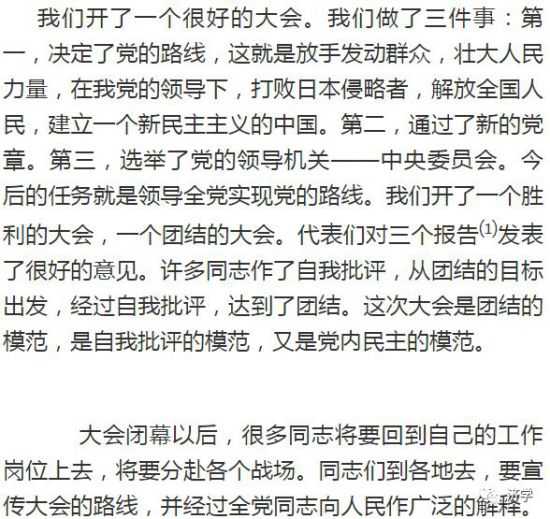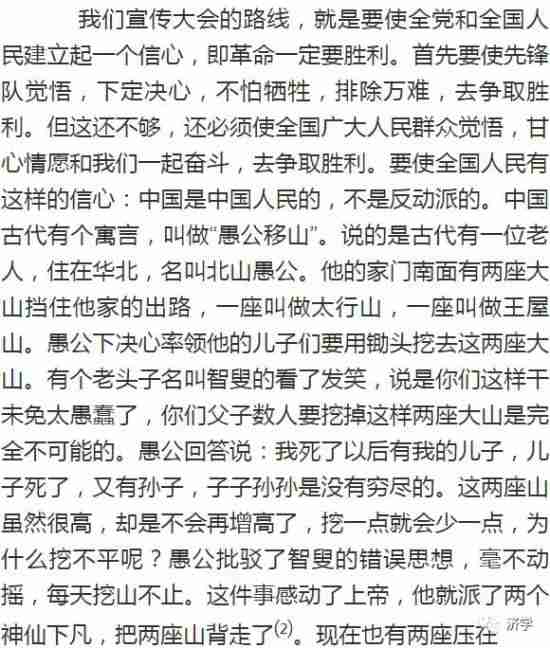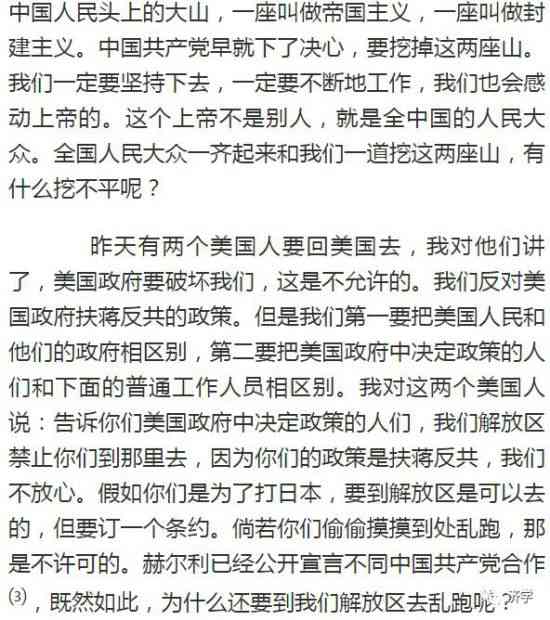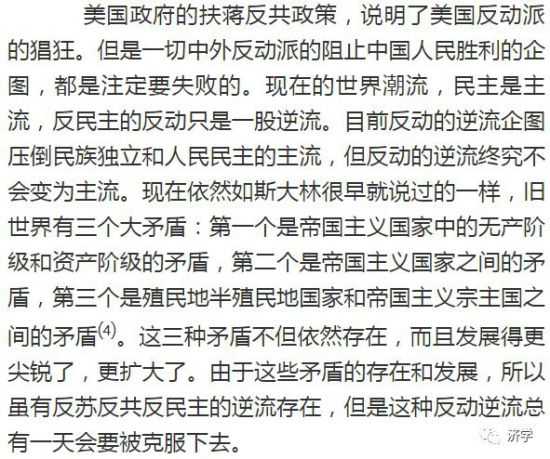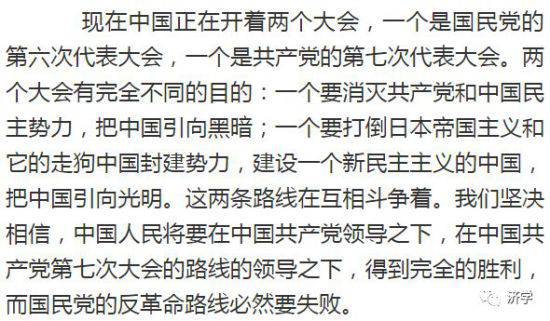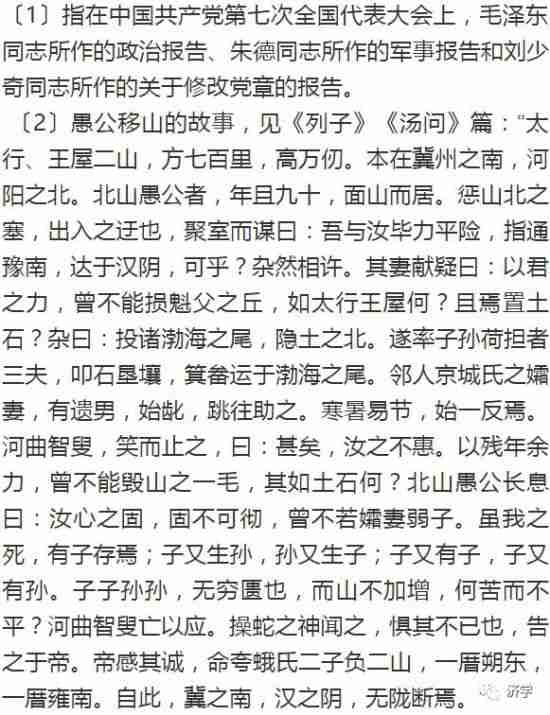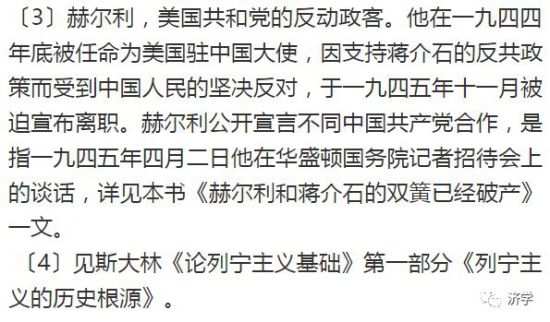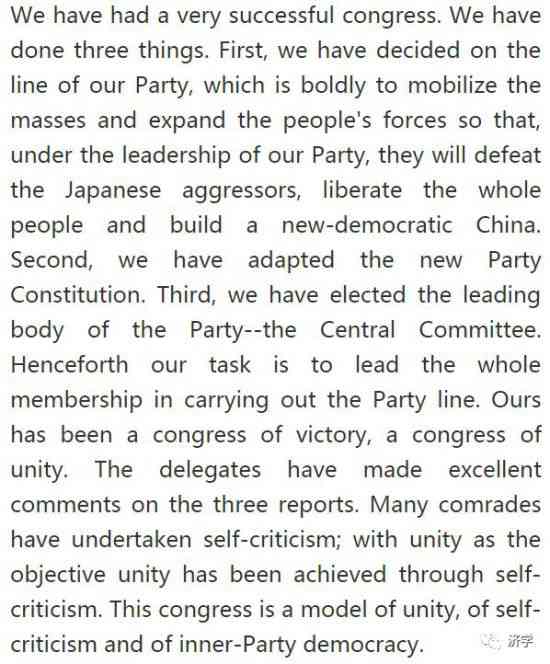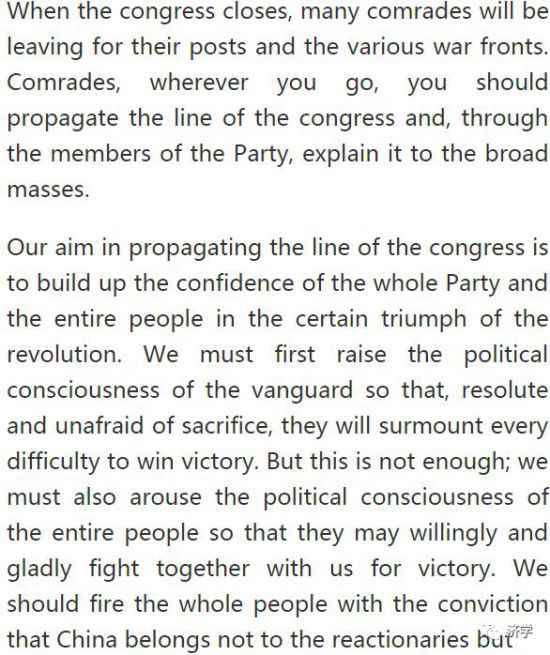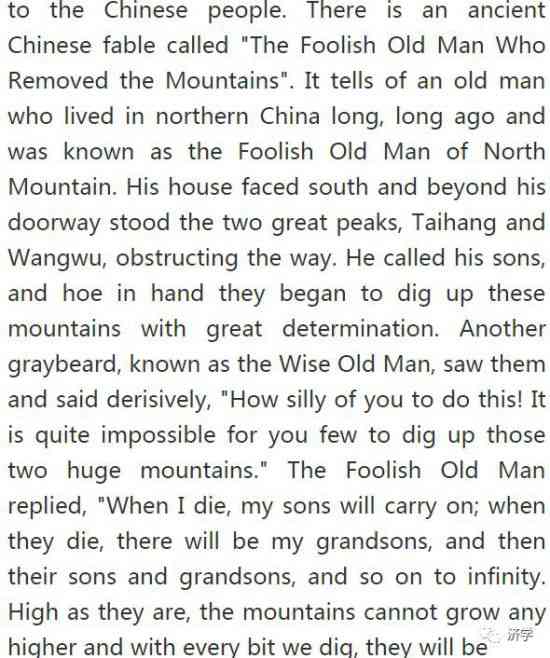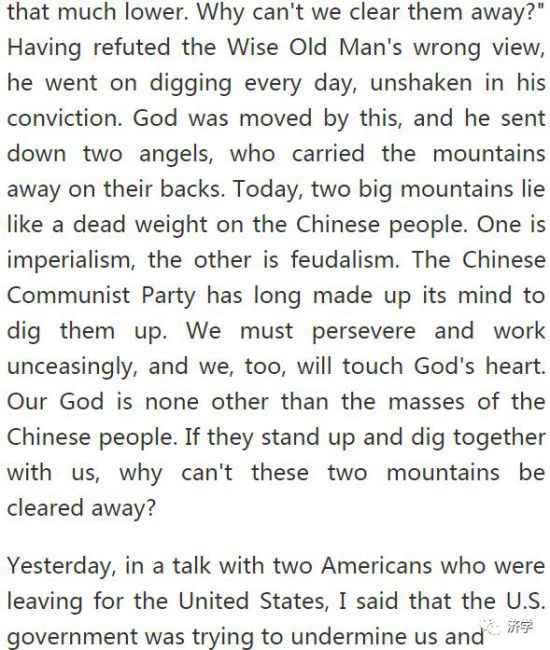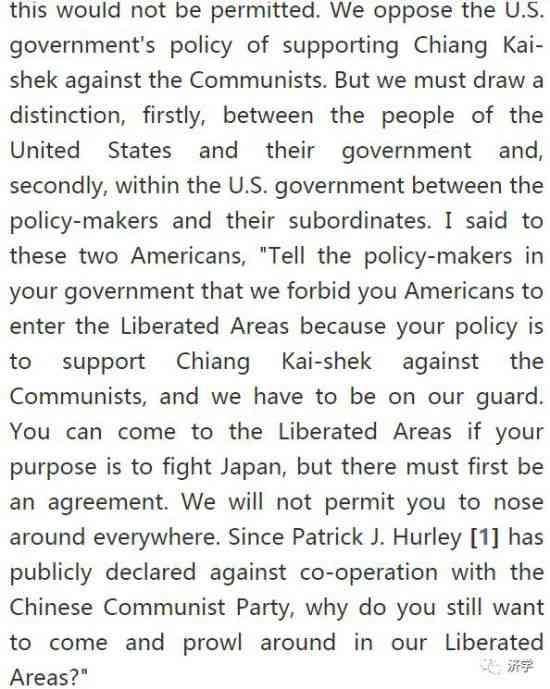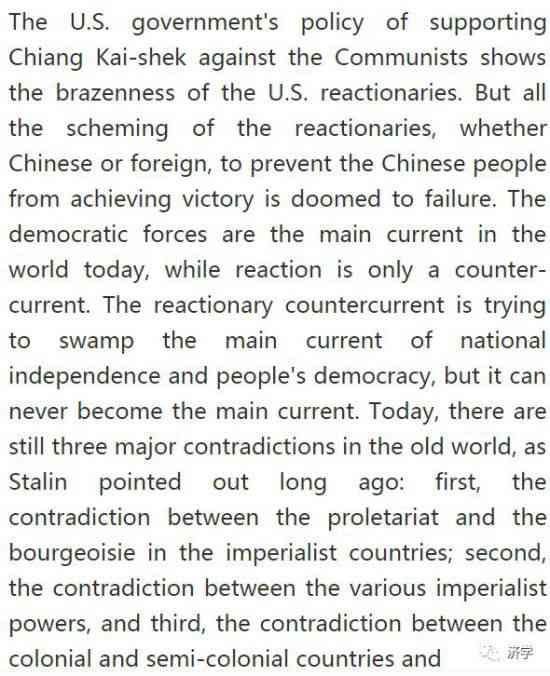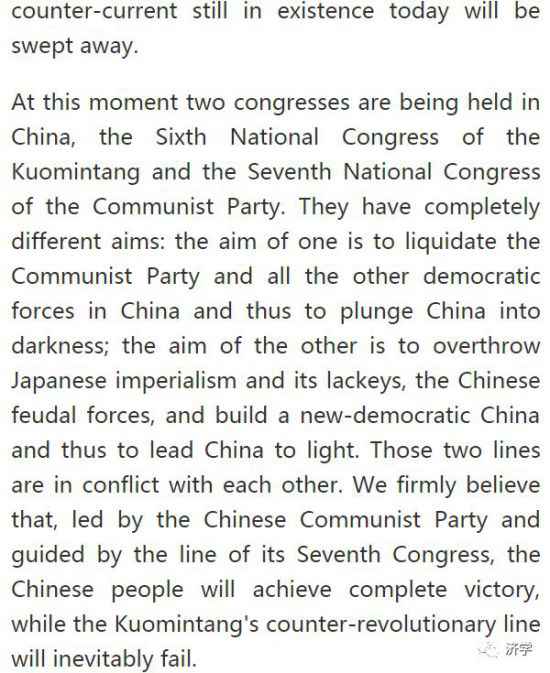李克勤(jixuie)題記:毛澤東文化里的“學英雄見行動”風氣,那算得上實實在在的道器變通——想得通說得通行得通的社會風氣。毫無疑問,這是毛主席革命路線指引的結果,可究竟如何走到“蔚然成風”這一步的,這需要從道器結合來認識、理解和解釋。其中有個極其重要的環節不可忽視,那就是普遍化的誦讀“老三篇”活動。
誦讀“老三篇”,在道層面是對毛主席的思想體系的深化認識,同時也是對共產主義世界觀理解的升華;在器層面,這又成了大眾化的自覺行為——這是后來一些人不太理解的,可那的的確確是看得見摸得著的。
“老三篇”作為一個整體,恐怕得從毛澤東文化來認識。
老三篇,指的是毛主席三篇經典著作——《為人民服務》、《紀念白求恩》、《愚公移山》。
都是毛主席在抗日戰爭時期的著作,其中前兩篇是為革命英烈而寫。
《為人民服務》把中國共產黨的信仰、信念、理想,用最通俗的語言加以表述、闡釋,這對于絕大多數識字不多的中國人民而言,其文化意義是不可估量的。
《紀念白求恩》,給我們展示了一位外國共產黨員的光輝形象,把國際主義精神,結合愛國主義情懷,在共產主義這個大背景下,說得清清楚楚,明明白白。
如果說《為人民服務》和《紀念白求恩》重點在講世界觀的話,那《愚公移山》則重點在講世界觀指導下的方法論。
老三篇,至少在中國,是不是最簡潔最生動,同時又是最準確的馬克思主義哲學文獻?
這難道不是毛澤東文化易識別、易認可、易實踐的典型?
最簡潔,就是沒有廢話。
最生動,就是描述性語言多,因為都是在說人物,如張思德、白求恩、老愚公。
最準確,那就不言而喻了。
老三篇緊緊抓住了三位古今中外的英雄的道器變通,那這樣的著作,可不可以算作文學作品呢?文學作品具有什么樣的功能?看看歷史進程吧!
下面把“老三篇”中英文收集整理,供參考。
01
—
為人民服務
1944年9月8日
這是毛澤東同志在中共中央直屬機關為追悼張思德同志而召集的會議上所作的講演。
注 釋
〔1〕張思德同志,中共中央警衛團的戰士。一九三二年參加革命,經過長征,負過傷,是一個忠實為人民利益服務的共產黨員。一九四四年九月五日在陜北安塞縣山中燒炭,因炭窯崩塌而犧牲。
〔2〕司馬遷,公元前二世紀人,中國著名的文學家和歷史學家,著有《史記》一百三十篇。此處引語見他的《報任少卿書》。
〔3〕李鼎銘,陜北的開明士紳。曾被選為陜甘寧邊區政府的副主席。
〔4〕這是當時陜甘寧邊區和華北、華中、華南各解放區所擁有的人口的總數。
SERVE THE PEOPLE
September 8, 1944
[This speech was delivered by Comrade Mao Tse-tung at a memorial meeting for Comrade Chang Szu-teh, held by departments directly under the Central Committee of the Communist Party of China.]
NOTES
1. Comrade Chang Szu-teh was a soldier in the Guards Regiment of the Central Committee of the Chinese Communist Party. A member of Communist Party who loyally served the interests of the people, he joined the revolution in 1933, took part in the Long March and was wounded in service. On September 5, 1944, when making charcoal in the mountains of Ansai County, northern Shensi, he was killed by the sudden collapse of a kiln.
2. Szuma Chien, the famous Chinese historian of the 2nd century B.C., was the author of the Historical Records. The quotation comes from his "Reply to Jen Shao-ching's Letter".
3. Li Ting-ming, an enlightened landlord of northern Shensi Province, was at one time elected Vice-Chairman of the Shensi-Kansu-Ningsia Border Region Government.
4. This was the total population of the Shensi-Kansu-Ningela Border Region and all other Liberated Areas in northern, central and southern China.
02
—
紀念白求恩
1939年12月21日
注 釋
〔1〕白求恩即諾爾曼·白求恩(一八九○——一九三九),加拿大共產黨黨員,著名的醫生。一九三六年德意法西斯侵犯西班牙時,他曾經親赴前線為反法西斯的西班牙人民服務。一九三七年中國的抗日戰爭爆發,他率領加拿大美國醫療隊,于一九三八年初來中國,三月底到達延安,不久赴晉察冀邊區,在那里工作了一年多。他的犧牲精神、工作熱忱、責任心,均稱模范。由于在一次為傷員施行急救手術時受感染,一九三九年十一月十二日在河北省唐縣逝世。
〔2〕參見列寧《民族和殖民地問題提綱初稿》和《民族和殖民地問題委員會的報告》(《列寧全集》第39卷,人民出版社1986年版,第159—166、229—234頁)。
IN MEMORY OF NORMAN BETHUNE
December 21, 1939
Comrade Norman Bethune,[1] a member of the
NOTES
1. The distinguished surgeon Norman Bethune was a member of the Canadian Communist Party. In 1936 when the German and Italian fascist bandits invaded Spain, he went to the front and worked for the anti-fascist Spanish people. In order to help the Chinese people in their War of Resistance Against Japan, he came to China at the head of a medical team and arrived in Yenan in the spring of 1938. Soon after he went to the Shansi-Chahar-Hopei border area. Imbued with ardent internationalism and the great communist spirit, he served the army and the people of the Liberated Areas for nearly two years. He contracted blood poisoning while operating on wounded soldiers and died in Tanghsien, Hopei, on November 12, 1939
2. See J. V. Stalin, "The Foundations of Leninism", Problems of Leninism, Eng. ed., FLPH, Moscow, 1954, pp. 70-79.
03
—
愚公移山
1945年6月11日
這是毛澤東同志在中國共產黨第七次全國代表大會上的閉幕詞。
注 釋
THE FOOLISH OLD MAN WHO REMOVED THE MOUNTAINS
June 11, 1945
[This was Comrade Mao Tse-tung's concluding speech at the Seventh National Congress of the Communist Party of China.]
the imperialist metropolitan countries. [2] Not only do these three contradictions continue to exist but they are becoming more acute and widespread. Because of their existence and growth, the time will come when the reactionary anti-Soviet, anti-Communist and anti-democratic
NOTES
l. Patrick J. Hurley, a reactionary Republican Party politician, was appointed U.S. ambassador to China towards the end of 1944. In November 1945 he was forced to resign because his support for Chiang Kai-shek's anti-Communist policy roused the firm opposition of the Chinese people. Harley's open declaration against cooperation with the Chinese Communist Party was made on April 2, 1945 at a U.S. State Department press conference in Washington. For details, see "The Hurley-Chiang Duet Is a Flop", pp. 281-84 of this volume.
2. See J. V. Stalin, "The Foundations of Leninism", Works, Eng. ed., FLPH, Moscow, 1953, Vol. VI, pp. 74-82.
「 支持烏有之鄉!」
您的打賞將用于網站日常運行與維護。
幫助我們辦好網站,宣傳紅色文化!
歡迎掃描下方二維碼,訂閱烏有之鄉網刊微信公眾號

